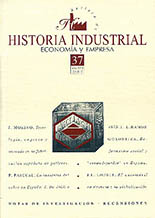The copper industry in Spain. 1. From 1900 to 1975
DOI:
https://doi.org/10.1344/rhi.v17i37.19923Keywords:
Industrialisation, Copper industry, Industry policty, SpainAbstract
This paper analyses the development of copper industry in Spain during the twentieth century. It describes the evolution of mineral, concentrates, copper and copper scraps foreign trade between 1851 and 1980, and shows that Spain, whic was an important exporter of copper mineral and concentrates during the nineteenth century, ended up depending on increasing net imports of copper concentrates, metal and scraps throughout the twentieth century. In addition, the paper shows that was due to domestic demand growth, whic was the result of the appearance of an industry of copper (and its alloys) refining and rolling, thanks to high tariff protection. The paper describes its evolution, its localisation, and the productive capacity that it reached in 1970. Finally, the paper describes the policy of restructuring of this sector, which was conceived at the end of Francoism –when J. M. López de Letona was the Minister of Industry– in order to increase its productivity and to cope with the challenge associated to the future Spanish incorporation to the EEC, and indicates the reasons for the failure of this first attempt of rationalisation of the Industry.Downloads
Downloads
Published
How to Cite
Issue
Section
License
The author assigns all rights to the publisher. Creative Commons
The author who publishes in this journal agrees to the following terms:
- The author assigns all intellectual property rights exclusively to the publisher for the entire duration of the applicable intellectual property rights.
- The publisher will distribute the texts under the Creative Commons Attribution License, which allows others to share the work, provided that they acknowledge the authorship, its initial publication in this journal, and the conditions of the license.





